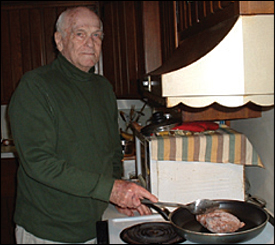
Am Fam Physician. 2007;76(10):1442
What does it tell you when your first hospitalization is at 88 and people care about you? On my 88th birthday I found out I had colon cancer. The day of my operation I went into the hospital and got my tests. Some time later, I was wheeled into my room after surgery. My pastor was waiting for me. I thought, “He has 2,000 families to look after and he kept this appointment to see me.”

My physical recovery was harder than I expected. I lost a lot of strength and my arthritis flared up, so I couldn't even walk for a few days. The physical therapist couldn't believe that I drove and cooked for myself before my hospitalization. I felt old and discouraged. I wondered if I could take some guidance from this experience. Did I have different obligations now? I prayed for a young heart, one that was peaceful, friendly, and loving—and strong—because I needed a push to get out of the rut I had fallen into. I was weak after the surgery, partly because I had gotten addicted to my lounge chair. I had not been open to giving and accepting help in the past. And while I am thankful that I got this wonderful care and up-to-date treatment, I asked: Why me? Was someone else harmed because I had the opportunity to be cured? Is it right that I got my surgery within 11 days of my diagnosis when so many in the world don't have this access? My friend in Canada has colon cancer, too. His surgery date is nine months from now.
Now, I am home and I feel much better. I've decided I don't have the right to waste time. I have stopped procrastinating. I have resumed cooking meals for the homeless. I'm interacting more with my family. I may not get a new heart, but I am trying to reshape the old one, because what's the use of a cancer-free colon if you can't learn from your opportunities and live a better life?—J.M., 88
COMMENTARY
J.M. showed up on my schedule six months after his wife died from lung cancer. He wanted to establish care for his diabetes and hypertension before he left to go to their beloved shore house for the summer.
Medically, J.M. remained healthy, leaving us time to talk. As he adjusted to life on his own, his visits encompassed so much more than blood pressure and glucose control. We talked about finding the Christmas tree ornaments that his wife so carefully packed away, about family, and about ways to overcome isolation. J.M. became depressed after his wife's death; cooking for the homeless was a way to get him involved in the community again. Knowing that his church was the mainstay of his life, it was easy to suggest volunteer activities through his parish.
We became friends, blurring the therapeutic relationship. When I saw him in the fall he felt fine, but he looked pale; his anemia was caused by the colon cancer that prompted his hospital experience. I suspect I may not have noticed if I hadn't known him so well.